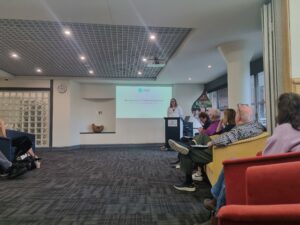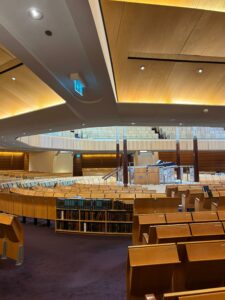From 5 to 19 May 2025, I conducted field research in Sydney as part of my PhD project, which critically examines the use of technology in museum-based representations of Holocaust survivor testimonies. The Sydney Jewish Museum (SJM) had recently concluded a temporary exhibition titled Reverberations (December 2022 – May 2024), which featured three interactive biographies of Holocaust survivors. These digital biographies – interactive, conversational representations of survivors – are part of Dimensions in Testimony (DiT), a project developed by the USC Shoah Foundation.

During my time in Sydney, I had the opportunity to interview Holocaust survivor Yvonne Engelman about her experience contributing her testimony to the DiT initiative. I also interviewed Pearl Blasina, daughter of Holocaust survivor Kuba Enoch, as well as Shannon Biederman, Senior Curator at the SJM. In addition to these interviews, I observed a DiT session led by Pearl and presented to a local New South Wales school group. This observation provided valuable insight into how students engage with interactive biographies, particularly in contrast to first-hand survivor testimony.

The trip also provided valuable insight into the Jewish and Holocaust survivor community in Sydney. Engaging directly with members of this community deepened my understanding of how Holocaust memory is shaped and sustained in the Australian context. Notably, Holocaust remembrance in Australia is highly centred around survivors and the Jewish community itself. Both groups play a prominent and active role in Holocaust education, commemoration, and preservation, particularly through outreach to school-aged students.
This contrasts significantly with the landscape in Britain, where – although survivors and the Jewish community are certainly present in memory work – their involvement tends to be less central and visible. The comparative nature of this observation revealed a difference in national approaches to Holocaust memory: in Australia, the narrative is deeply embedded in personal testimony and community-led initiatives, whereas in Britain, Holocaust memory is more often state directed, with survivor and Jewish community voices playing a less dominant public role.
Leah Lawford started a PhD in Holocaust Studies in September 2024, funded by the E. H. Boundy scholarship from the University of Exeter. Her project focuses particularly on the use of technology to represent witness testimonies in Australian and UK Holocaust exhibitions.